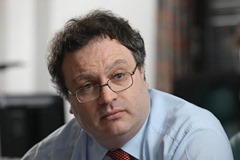Reform of teacher training still on track
 Michael McKernan summarises Stephen Farry’s plans to integrate teacher training.
Michael McKernan summarises Stephen Farry’s plans to integrate teacher training.
It was Employment and Learning Minister Stephen Farry himself who previously remarked: “People think it is bizarre that at this stage in Northern Ireland, our teachers are trained separately.”
Now, in late 2013, the Minister is well advanced in a process which, if he gets the outcome he wants, will result in much greater sharing and integration in teacher training in Northern Ireland.
When the Alliance Party MLA for North Down was appointed Minister in 2011, he inherited a tricky situation in the teacher training sector. Budget cutbacks and the introduction of higher tuition fees had put the spotlight as never before on the financial efficiency of the teacher training institutions, in particular the two university colleges, St Mary’s and Stranmillis. Although teacher training is also provided by the two local universities directly, as well as the Open University, the bulk of undergraduate training is provided by St Mary’s and Stranmillis.
Initial targets for the accountants were overall admission numbers and the liberal arts and other courses which the colleges offered to students outside of the teaching arena. A merger effectively bringing Stranmillis into the Queen’s University School of Education was also well under way.
Farry opted for what he called “a more holistic approach” to the problem and decided to review delivery of teacher training in Northern Ireland to include all five providers. He also parked the proposed QUB-Stranmillis merger.
Instead, the Minister launched a new two-stage process.
The first stage was a fact-based analysis of costs and sustainability including benchmarking with comparable providers in other jurisdictions. The second stage, based on the findings arising from the first phase, would involve a panel of experts devising new institutional structures which would deliver greater value and efficiency but equally importantly more sharing and integration.
Not surprisingly, Farry’s approach was a direct fit with Alliance Party economic policy which was substantially based on policy interventions to tackle the costs of division and segregation across all of government.
On 21 May this year, the first phase of work had been completed by independent consultants Grant Thornton and Farry announced the findings to the Assembly. He believed that the benchmarking had proven conclusively that Northern Ireland was “paying too much” for its teacher training and that he now had all the evidence necessary to move.
A few weeks later he announced an expert panel to carry out the second phase of work. The impressive panel is chaired by Pasi Sahlberg – an internationally recognised expert and currently Director-General of the National Centre for International Mobility and Co-operation in the Government of Finland. Dr Sahlberg would be supported by a four-strong panel of academic educationalists drawn from the UK and Ireland.
And the panel is free to think the unthinkable. The Minister has already made it clear that “this is not just a matter of cost … everything should be on the table.”
The expert panel which is currently gathering information and engaging with stakeholders, will report to the Minister in early to mid-2014. It is then that the Minister will discover if he has got a package of proposals that he can sell to the Executive and Assembly and which will deliver his goal of desegregated teacher training provision in Northern Ireland.
So far, Minister Farry has handled this process skilfully. He has not antagonised any of the stakeholders and has been at pains to recognise the high standards that currently exist in teacher training colleges.
However, when the expert panel reports it will almost certainly recommend considerable change, including change to St Mary’s and Stranmillis. These institutions have many friends in the political arena and it will be extremely interesting to see if the Minister can achieve his goal of greater sharing and integration against possible opposition and a political backdrop which, in recent times, has looked worryingly tribal.





